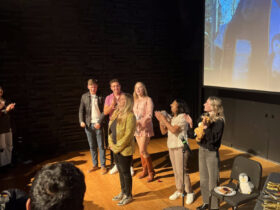There is often nothing more painful than seeing loved ones struggle some 10,000 km away. One thing more painful is the inability to reunite with loved ones due to the substantial risk of being detained or sent to prison. Seeing my family struggle, coupled with a sense of pride and simultaneous guilt for being Russian, makes things even more complicated.
In the beginning of the invasion, my social media pages were flooded with devastating scenes of Russian soldiers scarred by the war, distraught mothers seeing their sons leave for battle and Russian or Ukrainian intellectuals explaining the abhorrent nature of the war itself – but, as time goes on and free speech dwindles, the natural progression from protest to silence and survival increases. And for Russians, the survival instinct is a natural state-of-mind, having dealt with decades, if not centuries, of food insecurity, political instability and ethnic and cultural tensions.
In my case, my blue passport shields me from most, if not all, consequences of Russia’s invasion of Ukraine, allowing me to, regardless of my own tribulations, be nestled in a democracy far far away. From visa restraints to sanctions, Russian people, including my entire extended family, have been crippled by the ongoing conflict — and without detracting from the loss of human life and turmoil on the Ukrainian side, I would like to shed light on the effects of the war for Russian people, and specifically, my best friend, my dedushka.
I spent every scorching hot summer and freezing winter in Moscow and Rostov-on-Don, a city a few hours east of Ukraine. I always wore the same uniform: my Nike hot-pink tennis outfit from Maria Sharapova’s tennis line (who I idolized) and a small passport holder around my neck – a plastic contraption enforced by TSA for unaccompanied minors flying across the world. Life as I knew it was a multicultural one, shaped by the historical anecdotes told by my Slavic family members about the region’s sociopolitical structures, the dissidence, the fight for social justice and the bravery of immigration. My most favorite stories, however, were the ones my grandpa told me.
Picture the most Soviet-esque man: brooding, tall, handsome, with a cigarette in one hand, a Tolstoy novel in the other and a frown — a frown that manages to disappear anytime he looks at me – that is my grandpa. He bought me that hot pink tennis outfit and I never took it off. He also perpetually yelled at me to change out of that hot pink tennis outfit and put my hair up so I didn’t get mud on myself from running around on our dacha — all while smoking a cigarette.
But the thing is, my grandpa was never able to raise his voice at me, or even tell me “no.” Every night, right after dinner, I would make my family, and particularly my grandpa, watch me perform a dance. Growing up, that meant either “Party in the USA” by Miley Cyrus, or some other Hannah Montana song that I had been practicing the entire afternoon prior. He was always the first one sitting in the living room waiting for me to perform while the rest of the family trickled in.
I loved cars growing up — even the famous Russian Lada, for some strange, sentimental reason — and my dedushka knew. Every now and again, he would buy the remote control car that I dreamt of having, or run to the store the minute the batteries died in the old one. There was no telling him “no” either — my dedushka wouldn’t stop until everything in my life was perfect.
My dedushka and I would watch the Russian comedy channel every night in the kitchen, smelling the aromas from whatever my grandma cooked for us that evening. Our favorite was Селёдка под шубой, or Herring Under a Fur Coat, and we would sneak a spoonful everytime my babushka wasn’t looking. We loved playing games and tricking each other — I like to think that I made him feel like a kid again.
Even when I was older, my dedushka was a shoulder to cry on. I vividly remember sobbing on his shoulder after watching Harry Potter and the Deathly Hallows Part 1 in which (spoiler) Dobby dies on a beach. My grandpa, in an effort to cheer me up, promised that we’d go to a similar looking beach someday, because we had never done so before.
It’s been nearly 5 years since I’ve seen my dedushka — and no beach trip in sight.
While the memories of my dedushka are visceral, his memory, on the other hand, is slowly deteriorating. The Russian medical system, a system as lackluster and prehistoric as it was during the Soviet times, is currently failing him, as he is unable to get proper medical treatment for his degenerative disease.
Outpatient departments, or polikliniki, aren’t receiving sufficient government funding, and thus, the patients with severe medical conditions, such as my grandpa, can’t receive prompt medical treatment and are often forced to seek expensive treatment options in the private sector or buy medications on the black market.
My grandma, a diabetic, is often worried about the availability of insulin, which isn’t always in stock in Russian pharmacies. Shortages of medications are a direct outcome of Western sanctions against Russia, and despite the country producing more of its own drugs, manufacturing, distribution and transportation channels have not been optimized.
My grandparents’ monthly retirement income comes to around 250 dollars, an impossible amount of money to live off of in any Russian city, but Moscow in particular. Some families in Moscow are privileged enough to rent out their city apartment for passive income while living on their dacha, typically on the outskirts of the city. But with economic conditions deteriorating, the cost of living increasing, and high-skilled workers fleeing the country, many families, including my own, are struggling to find renters. To be clear, this is a “lucky” problem to have, as most families and retirees outside of major cities have once again settled into a life of poverty.
Russians are also extraordinarily family-oriented, and in some ways the very opposite of the individualist mindset of the United States. There is often a socio-economic relationship between the child and the parent, as children are meant to grow up to take care of their parents and grandparents as a form of repayment for having been raised and educated by them. More often than not, children financially support their parents; yet, for children living outside of Russia, it is now impossible to send money to family, visit them, or help them escape. And, for a family like mine that is debilitated by medical bills, surviving off of a pension and unable to receive any assistance from family abroad, the struggle is real — and it will only get worse.
I was rambunctious, stubborn and talkative as a child — and my dedushka loved me just the way I was. It would be terrifying to lose my memories of him, the same way he will lose those memories of us very soon.
Every family on either side of the war has a unique and often painful story to tell. My story is that of my dedushka and me — and I sure hope this story has a happy ending.







